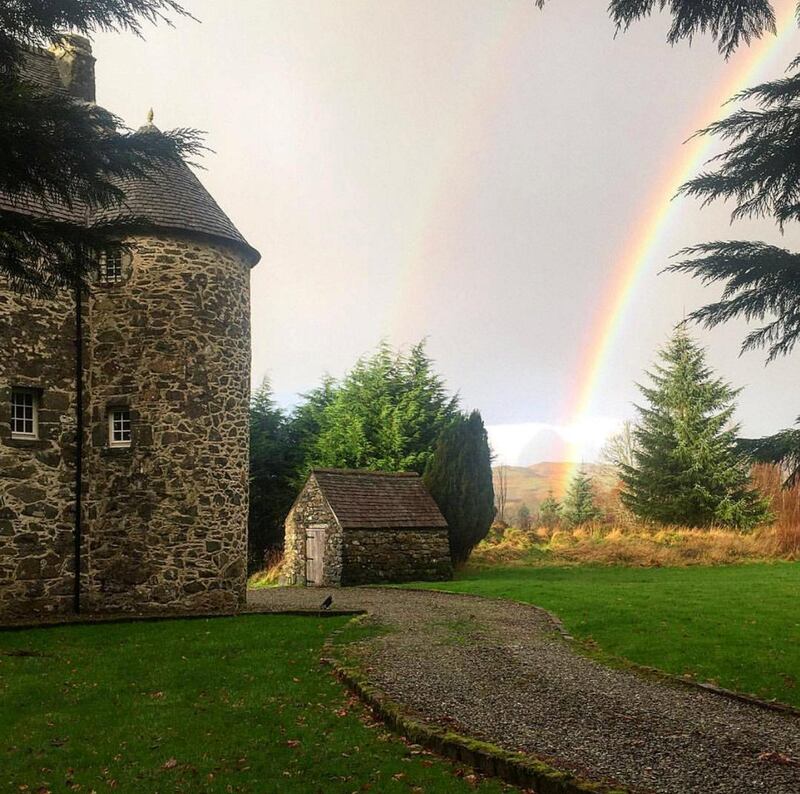It was in a newspaper article that British radio personality Stef Burgon first spotted Kilmartin Castle, built in the 16th century near Kilmartin Glen, in Scotland.
Her husband Simon Hunt, from Australia, is what she would call “very encourageable”, which is how the longtime Dubai residents became the proud – if slightly unlikely – owners of a castle in Argyll and Bute in 2015.
“We’d just been on a massive road trip around Scotland for a month,” says Ms Burgon. “I said ‘oh, look at this castle for sale. I’m not saying we should buy it, but maybe one day we should look at buying something like this’. He was like, ‘we can buy a castle?’”
Flash forward to today and the couple have been renting their property out on Airbnb to an assortment of guests for the last three years, with the last year bringing in a gross income of about £64,000 (Dh313,588). Now they plan to take their venture one step further and turn it into a business that they run full-time.
The castle owners have just left the UAE for good, with their final destination to relocate permanently to Kilmartin Castle. But first, they bought a camper van and have six months of touring Europe ahead of them, with only what they need in belongings and Ms Burgon’s cat Frank in tow.
“We kind of encourage each other to do daft things,” says Ms Burgon. “And they work out.”
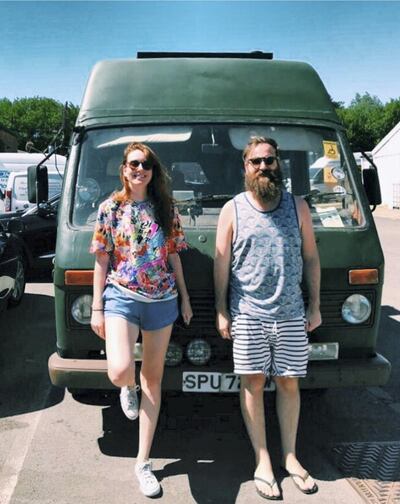
It was in February 2014 that Ms Burgon and Mr Hunt, both travel and adventure lovers, would make their castle-buying decision and set out to find an offshore bank, Natwest International, that would lend them the money to do it. There were several hurdles to overcome before the mortgage could be secured.
“[Sorting the mortgage] took around 10 months,” says Ms Burgon, “as the bank was familiar with lending against apartments in London but not a castle in Scotland built in 1550”.
Their bank required at least a 50 per cent deposit, the bulk of which came from a house Mr Hunt sold in Adelaide and the rest they managed to scrape together. They were able to secure the property, which was sold through a sealed bid, for £400,000 (Dh1.95 million).
It was April 2015 by the time they got the keys. And although the castle had been renovated in the 1990s, it had been empty for years and needed a lot of work.
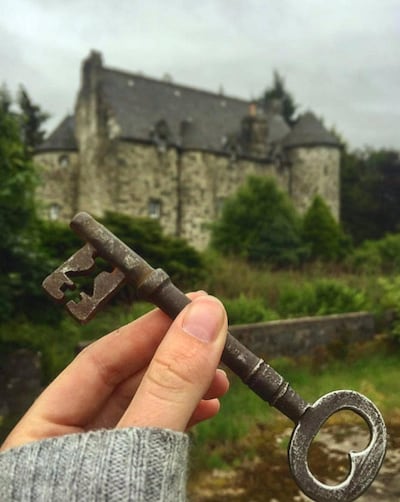
To get it into habitable, rentable shape, the couple initially spent between £30,000 to £40,000 fixing the most necessary items, including the roof, as well as general redecorating, buying furniture, art, bedding and other items.
One unforeseen expense was the plumbing and septic system, which broke the day before their wedding and cost £4,000 to fix.
With the help of a key person needed to run a business from overseas, castle manager Karen Paterson, the pair have been renting the castle out with each year, “busier than the last”, says Ms Burgon.
“So far it's been a real mix of guests on Airbnb,” she says. “We have had tech people from Silicon Valley, MPs from Scotland, someone who worked at the White House, groups of archeology lovers, authors, wellness retreat groups, families who live around the world reconnecting at our place and also honeymooners as well as a few couples who have eloped with only a photographer.”
While the castle made a gross income of £11,000 in the first year, it secured £32,000 the second and £64,000 in the third and is now running at around a 50 per cent profit rate.
"That’s with staff and bills and mortgage etc," says Ms Burgon. "Year four will be different because we will be closing for six months for refurbishment."
_______
Read more:
How to manage an overseas property investment
Real estate the best asset class of the moment but gold could be the next crypto
Should UAE residents focus on retirement or paying down their mortgage?
Counting the cost of shipping your belongings from the UAE
How to ensure a smooth exit from the UAE when it's time to relocate
________
The castle's monthly outgoings are currently around £3,000, which includes the mortgage and the castle manager, but Ms Burgon says they will be less after the renovation.
"A big part of our outgoings is an electricity bill and we will be changing the heating system to something more efficient," she explains.
While Airbnb – which charges 6 per cent of the let – accounts for 70 per cent of their bookings, they also rent out the castle using sites such as Celtic Castles and Booking.com.
"With Airbnb, there have only been two guests that caused trouble: one group of young friends who got in touch over Instagram and the place was not left very clean; with the other, some bedding went missing. Airbnb helped us resolve that with a payout from the guest," says Ms Burgon, adding that they are selective about whom they take bookings from now.
To keep their rating high, they listen to what people love such as cakes and locally sourced coffee beans in the kitchen on arrival as well as a selection of cookbooks and records.
"We also keep in mind why they are coming. If they have told us it’s for an anniversary then we will always leave a card and a bottle of something to help them celebrate. Our castle manager acts as a local concierge and can help them plan interesting things to do. Also we have a chef who will come in and cook dinner during their stay," says Ms Burgon.
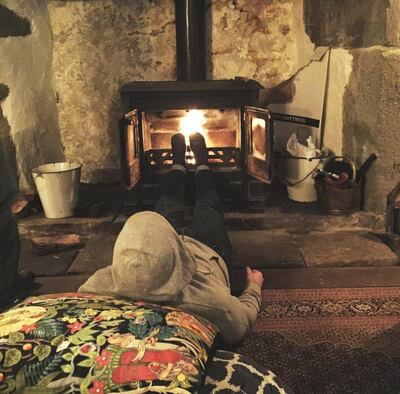
The couple, who plan to hire a small staff, will be paying the property off for another 20 years and expect to spend another £150,000 on the refurbishment, which starts in January of next year. When they reopen in June of 2019, they plan a mix of exclusive lets starting at £500 per night.
“We will also be venturing into the world of luxury bed and breakfast, with rates starting at £180 to £260 per room per night,” says Ms Burgon, adding that the business model that is "organically evolving" is to run it as a bed and breakfast in the summer offering individual rooms and living in one of them.
“While we are living there, we will have room for four couples and we hope to introduce some popup dinner nights, live music, comedy and a regular farmer’s market in the grounds.
The couple have calculated that they can live comfortably running at a 50 per cent occupancy rate though it currently operates at a 75 per cent occupancy.
For the rest of the year, the couple will run exclusive lets and travel in their van.
Looking ahead, they hope to make around £60,000 net profit per year with the new business model. That's quite a leap from the moment they first had the castle keys in hand and began to make a plan to move there, take a year off, travel, and fund the renovations, which they knew would involve some major sacrifices.
“We’ve been saving ever since,” says Ms Burgon. “Just doing nothing but saving money.”
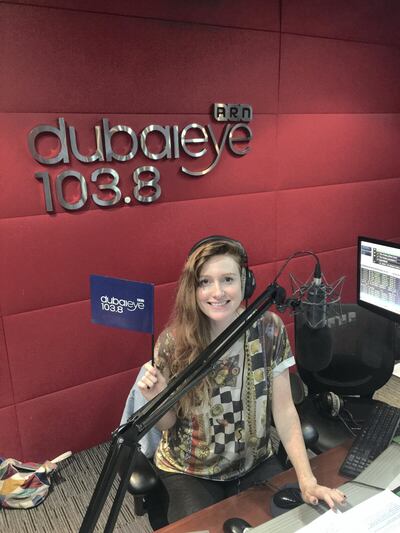
They made themselves some rules, which included no shopping for clothes in the UAE. And, while they continued to travel, they only indulged in the odd treat when overseas.
“I drove a Kia Picanto, which I bought for Dh10,000,” says Ms Burgon. “It never let me down and I sold it for Dh2,000, so it cost me approximately Dh4,000 a year with re-registering, etc, and only cost Dh50 to fill the tank.”
They frequented restaurants in Deira, Karama and Satwa, saving “a fortune” over more expensive venues. Deciding good meat was too expensive in Dubai, they gave it up. Instead, they did most of their shopping at the Farmer’s Market on the Terrace in Business Bay, spending Dh100 on vegetables that would do for a week.
“Simon started his own company as a side hustle making Above Sandboards,” says Ms Burgon. “Then at the very end our amazing friends let us move in with them for three-plus months, so we saved a lot of money on rent. We loved saving. It made us feel like we were winning.”
Ms Burgon knows all too well that keeping up with the Dubai lifestyle can bleed money – but argues it does not have to be that way.
"I think it's easy to get pulled into expensive brunches and expensive cars and villa life and hitting the malls on the weekend to do a bit of shopping," she says. "My advice is to find some good friends who like cooking, camping, binge-watching Killing Eve and going to the movies."
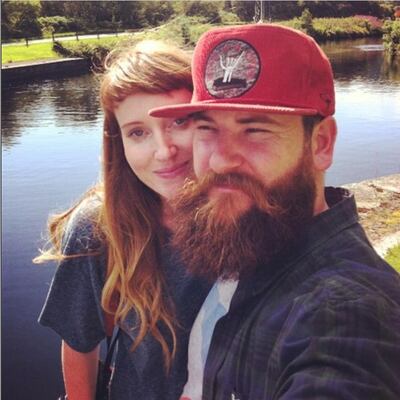
While the couple's time in Dubai has ended, it began in the most roundabout of ways more than a decade ago.
Ms Burgon was 26 when she moved to the UAE from Newcastle with Catboy, real name Simon Smedley. She was only helping him out at the station, planning to get a job in her field of her property, when management paired them up for the morning show.
While the couple spent three years of their time on-air married, they would confound and delight their management, co-workers and listeners by later revealing that they had been secretly separated for six months. After they divorced, Ms Burgon met Mr Hunt, a creative director.
The couple budgeted £10,000 for their six-month European adventure, spending £4,500 on their van. They hit their first snag early this past weekend, breaking down on day one, paying £180 for motorway rescue and spending the afternoon watching England advance in the World Cup with the staff from Subway in a service station near Birmingham, England.
It turns out the van needs work, which means the first weeks of their trip will be spent in a hire car, says Ms Burgon.
“It’s going to be an expensive learning curve,” she says.
For anyone else, this might be a worrisome start to their new life. But when it comes to making big life changes, Ms Burgon sums up her outlook with a “what’s the worst that can happen?”
Moving to Dubai from Newcastle all those years ago opened up her world, fostering both a sense of adventure and teaching her that risk is worth the reward.
“I feel like I’m braver now,” she says. “Just from traveling and growing up. And I do think that Dubai keeps you young.”
The pair are waiting until they land in Scotland to tackle their annual budget, as well as what they will both do next – if anything – outside running the property. Ms Burgon, for example, is pondering podcasting.
“We’ve realised that we don’t need that much money to live the kind of lifestyle we’re interested in and would prefer a better work-life balance,” says Ms Burgon.
The Kilmartin Castle finances
Sale price: £400,000
Downpayment: £200,000
Initial spending for necessities and repairs: £30,000 to £40,000
Mortgage length: 20 years
Renovation budget: £150,000
Annual income (last year): £64,000
Monthly expenses: Dh3,000
Future revenue: The couple have not worked out a total yet, but see it as mix of exclusive lets, at £500 per night, and luxury bed-and-breakfast per-room rentals, for £180 per room per night
